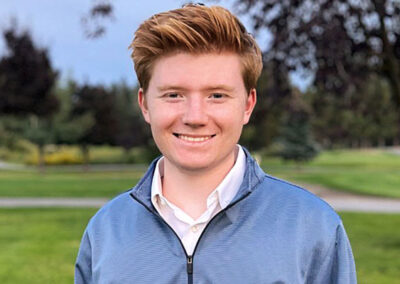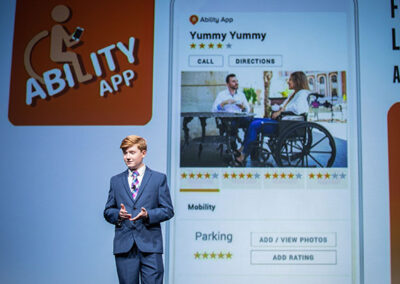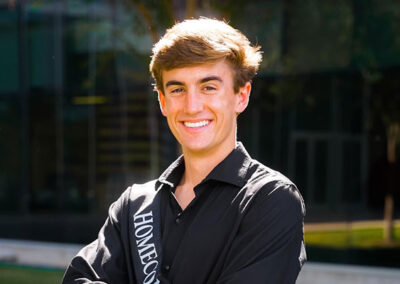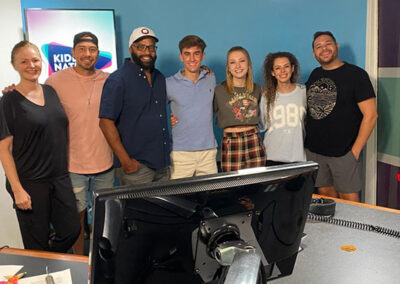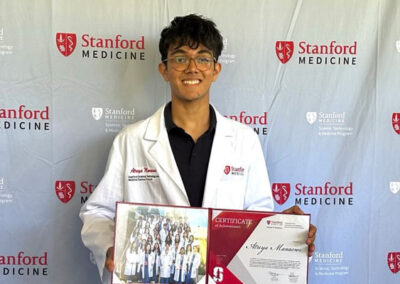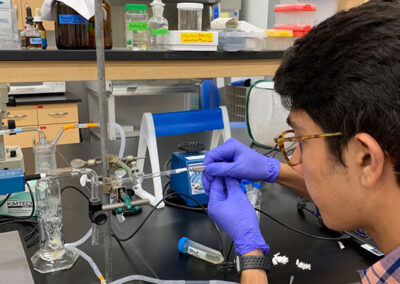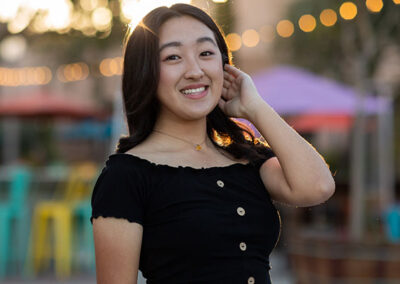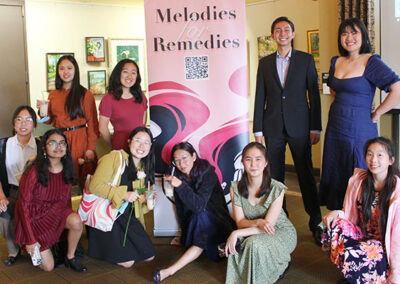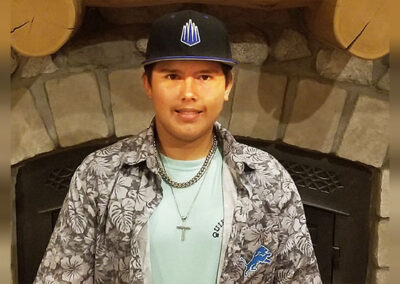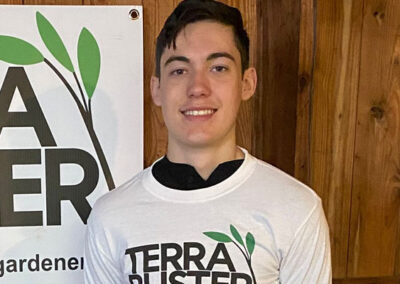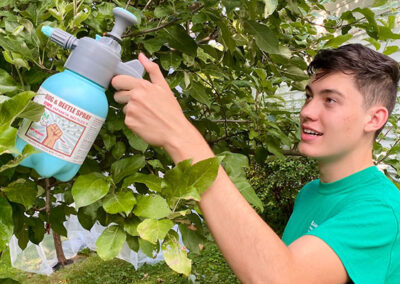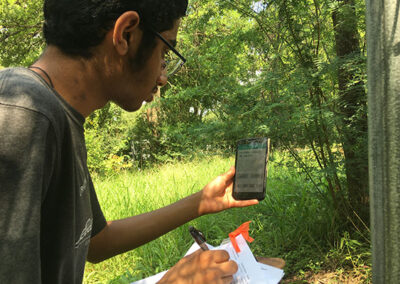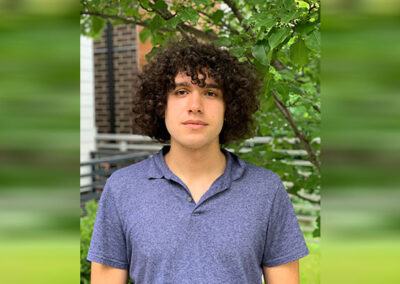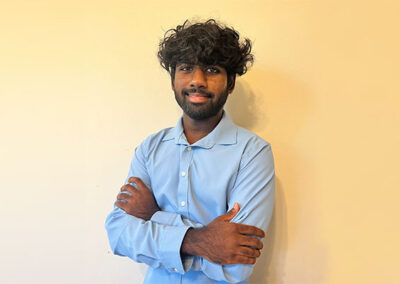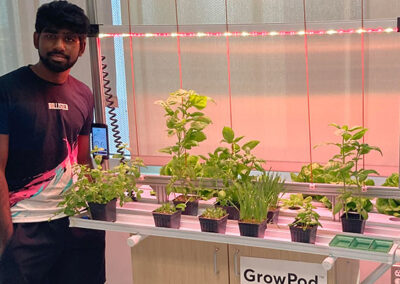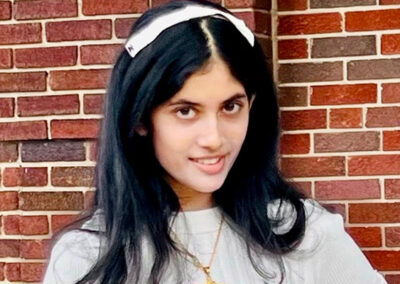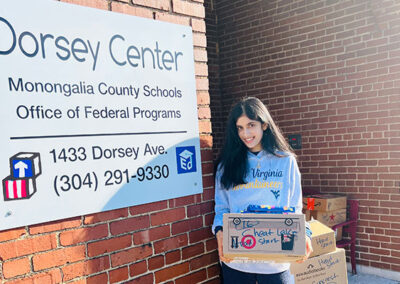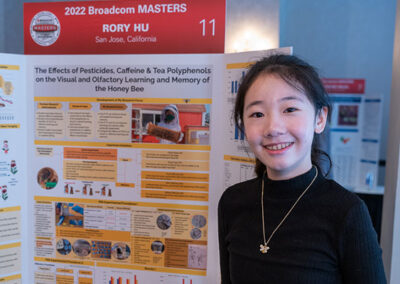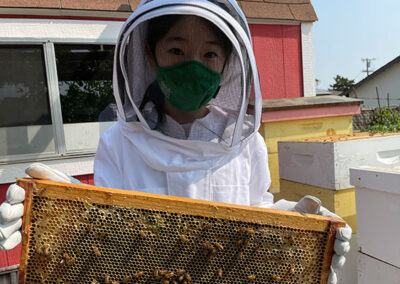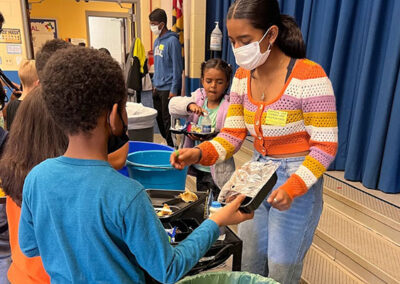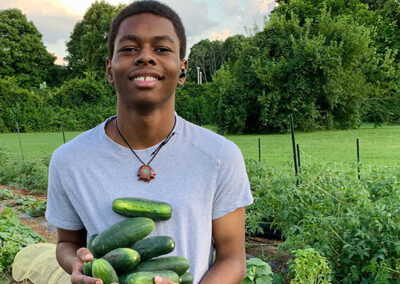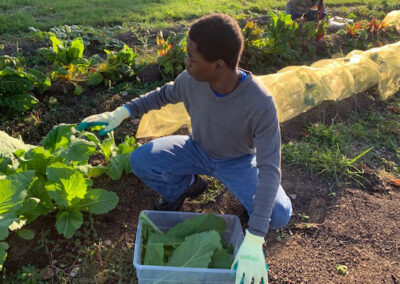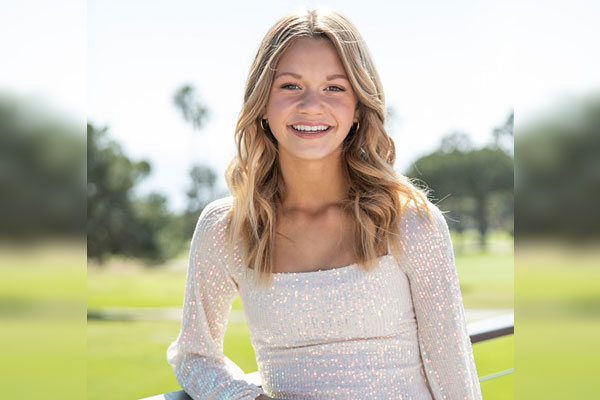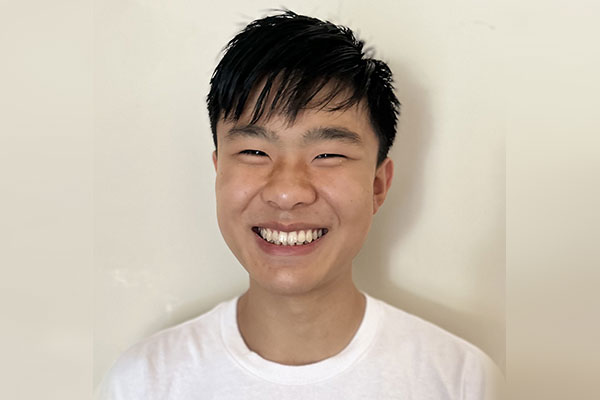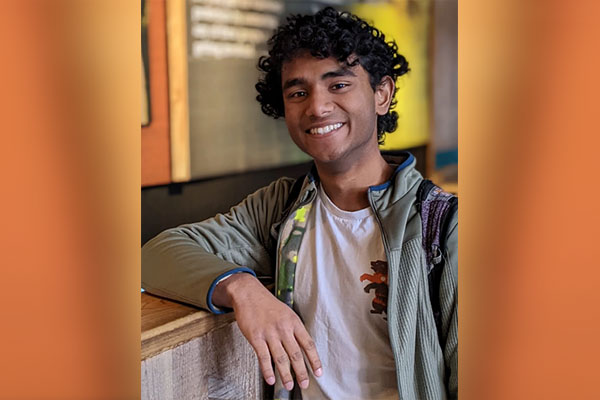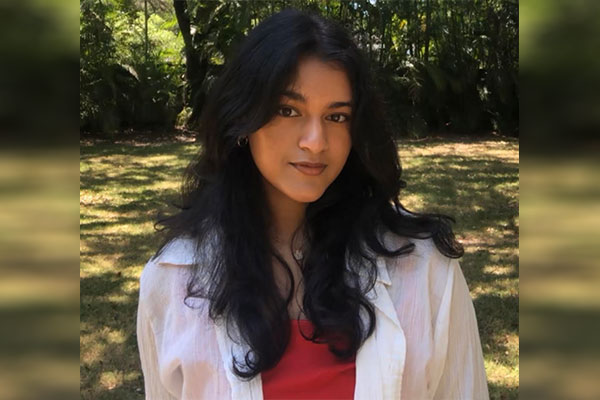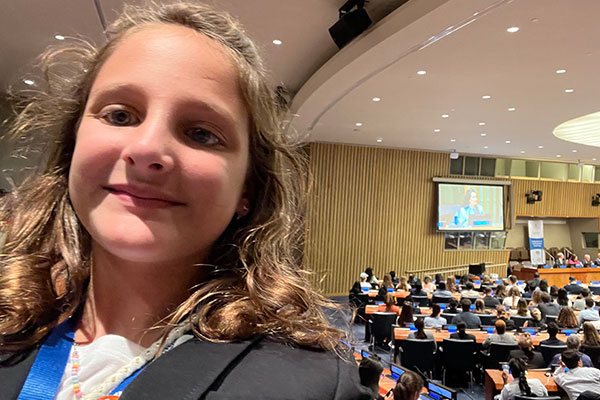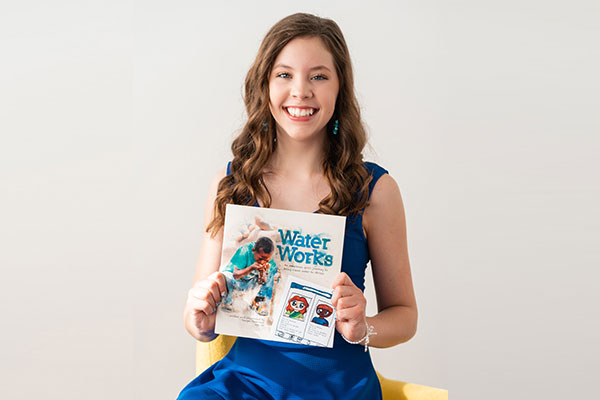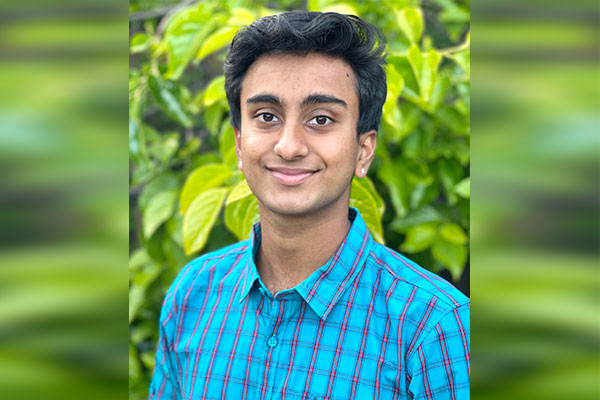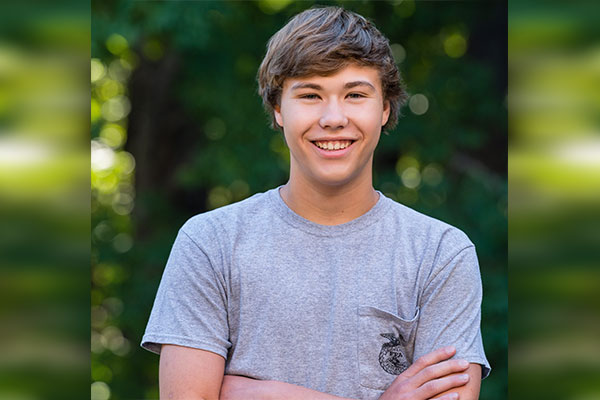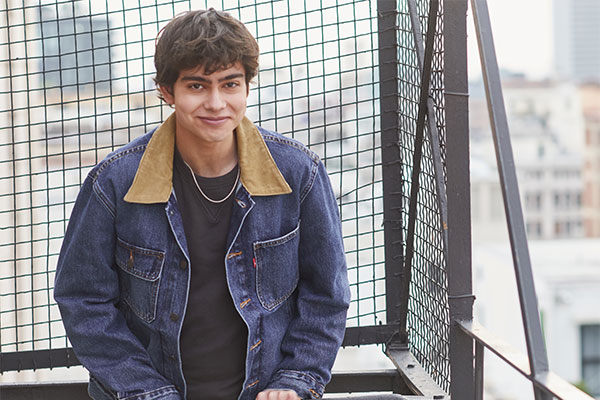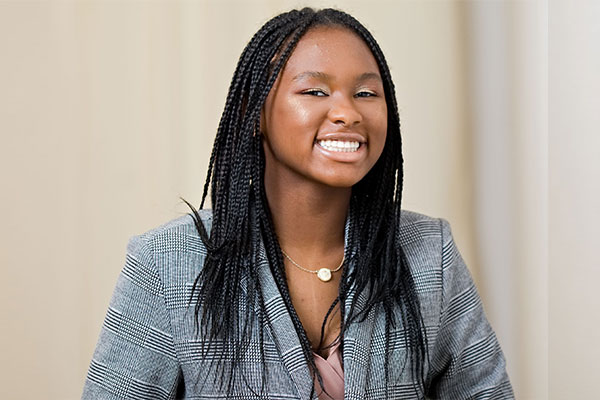Barron Prize Winners
2023 WINNERS
Earth911 (Environmental Winners) – 02/29/24
The Week Junior – 10/06/2023
Alexander Knoll
Ability App
Age at Winning Prize
Home State
Additional Media Coverage
Alex spent several years brainstorming and developing a prototype app and at age 12, was invited onto Ellen DeGeneres’ show. She presented him with a $25,000 check from Shutterfly to develop his app, and emails of support flooded in from around the world. When he needed more funding, Alex began touring as a keynote speaker, sharing his passion for accessibility and promoting awareness of its importance. He has presented keynotes in Switzerland, Slovakia, and beyond, turning all of his earnings back into his app. His travels have also allowed him to connect with accessibility advocacy groups, people with disabilities, and researchers worldwide. Their insight has helped fine-tune his app and their support has fueled his work. “I’ve learned that when things are important enough to you, you should never give up,” says Alex. “I was told ‘no’ so many times during development of the Ability App but I kept going because I knew it could help so many people.”
Armando Parrish
Project Lorenzo
Age at Winning Prize
Home State
Additional Media Coverage
The Power of Young People Podcast – 02/07/24
ABC News – 12/08/23
Living Magazine – Oct 2023
Armando began his work nine years ago when he first met Lorenzo, a gentleman who has lived for two decades under the highway near Armando’s mom’s office. After years of bringing food, batteries, and toiletries to Lorenzo, in 2021 Armando raised $4,000 through a GoFundMe campaign to provide long-term hotel stays for his friend. Drawn to do something more sustainable, he decided to finally launch the nonprofit he’d been musing about for years — and named it after his longtime friend. Project Lorenzo is now part of the All Neighbors Coalition, a group of 100 Dallas area nonprofits working to end homelessness. Armando has begun talks with a Coalition shelter about expanding his Skilled Jobs program there. “My work has taught me that people are good, and they are generous,” says Armando. “People will contribute to a worthy cause because no one wants to see another struggling.”
Atreya Manaswi
Created Eco-friendly Option for Controlling Pests in Bee Hives![]()
Age at Winning Prize
Home State
Additional Media Coverage
Since then, he has worked with the US Department of Agriculture and developed a novel blend. His most recent field trials spanned 12 weeks in the Florida heat and involved 24 hives containing two million bees! He has spoken at the United Nations, and shared his work with beekeepers, farmers, and youth across the globe. Atreya has also published The Bee Story, a picture book that teaches young children about honeybees, their hives, pollination, and the work of beekeepers. He is currently working to advance his project and provide beekeepers and farmers with an easy-to-use and even cheaper method for using the organic blend. “I’ve learned the hardships of beekeeping and how tiring it is to put food on our plates,” says Atreya. “I’ve also come to understand the power that lies in our youth and the capacity that we have to innovate and create change.”
Atreya’s story is featured on our sister site, Inspiring Young Heroes.
Grace Sun
Melodies for Remedies
Age at Winning Prize
Home State
Additional Media Coverage
Two years later, Grace stumbled across an article about music therapy as a possible treatment for Alzheimer’s. Intrigued, she and her team performed their usual classical program for an audience of Alzheimer’s patients — and were met with silence. They decided to overhaul their repertoire, replacing Beethoven sonatas with oldies from the 1950s. At their next concert, the Alzheimer’s seniors smiled, clapped, and sang along with the familiar tunes. An aspiring physician-researcher, Grace is fascinated by the cognitive benefits performing arts can provide and is interning with Alzheimer’s San Diego. Melodies for Remedies is working to increase awareness of the disease and has raised $4,000 to support research as well as music therapy materials. “Through benefit concerts and raising awareness of dementia, I hope to grow my musical cause for the community,” says Grace. “I hope the music we bring can touch more people’s hearts and bring joy to everyone involved in the program.”
Mateo Lange
Created a Community Recycling Program![]()
Age at Winning Prize
Home State
Additional Media Coverage
When his drive brought in over $7,500, he resolved to continue it and to donate the next round of funds to another youth organization. He has done this continuously for three years, working every weekend to sort, clean, and stack recyclables in large trailers located at the convenience stores his family owns. The same recycling company that for years has picked up bottles and cans from the stores now does so in support of local causes. Mateo runs his program under the umbrella of his community’s nonprofit youth baseball team, the Northern Michigan Cyclones. He is one of 15 students across the country serving on the Youth Advisory Council for the Kroger company’s Zero Hunger/Zero Waste initiative. “I’ve realized that it’s important to get involved because if we don’t, who will?” asks Mateo. “I would much rather be a part of the solution than believe that someone else will eventually fix the problem.”
Matias Habib
Developed an Eco-Friendly Japanese Beetle Pesticide![]()
Age at Winning Prize
Home State
Additional Media Coverage
Matias used a $1,000 cash prize from an innovators contest to launch his TerraBuster business. He purchased ingredients in bulk, built a website, and hired his friends to fill bottles and glue on labels. He sells his products at the local nursery and online to commercial farmers and home gardeners. Matias is passionate about promoting sustainable farming and Integrated Pest Management. He has helped Harambee Gardens, a community garden in an underserved neighborhood of Chicago, address its Squash Bug infestation by developing a prototype bio-pesticide powder. He was recently honored as a 2023 Youth in Action winner by National 4-H. “Through this experience, I have overcome social anxiety and developed confidence in my ideas,” says Matias. “And I have learned that by following our passions, we can all make a positive impact.”
Nathan Elias
InvasiveAI![]()
Age at Winning Prize
Home State
Additional Media Coverage
Nathan began his work four years ago after his grandfather, a longtime farmer, lost his rice paddies in Southern India to a new and aggressive invasive plant. Determined to help, Nathan began creating an AI tool to help farmers identify invasive species. When he struggled to find a comprehensive dataset, he built his own, taking thousands of plant photos on his iPhone. He also spent hours talking with farmers and worked with University of Texas researchers to develop his algorithms. Field tests across the U.S. brought a collaboration with Texas and the U.S. Parks and Wildlife Service that allows app users to request help from local experts in managing invasive plants. Nathan has also field tested his app in India and has shared his work in journals and at conferences around the world. “Growing up, I’ve always felt that creating impact was something only ‘the experts’ could do,” says Nathan. “Creating InvasiveAI has been a transformative experience for me because I have realized that regardless of my age, I can have a direct impact on the world.”
Rafi Ahmad
Operation Viridis ![]()
Age at Winning Prize
Home State
Additional Media Coverage
Scout Life – Mar 2024
WGN-TV – 01/19/24
Block Club Chicago – 01/05/24
Diversity in Action – Jan/Feb 2024
Rafi traces his project’s roots to personal experiences that engendered a long-standing commitment to social justice, most notably the 2018 contentious merger of his affluent and majority-White middle school with a neighboring and struggling majority-Black school. As many of his friends fled the district, Rafi chose to stay and launched a peer math coaching program for students in need. He is keenly aware that the need for climate justice extends far beyond Chicago, and is pursuing partnerships with the goal of scaling Operation Viridis to the national level and beyond. “Operation Viridis has opened my eyes to the power and potential of youthful curiosity and creativity to drive impactful social change,” says Rafi. “It has also renewed my faith in our ability to address climate change.”
Rahul Vijayan
Farm to Tray ![]()
Age at Winning Prize
Home State
Additional Media Coverage
Rahul launched Farm to Tray after noting the lack of fresh produce served to students who rely on school meals. He figured growing produce hydroponically could help while using 90% less water, zero soil and pesticides, and less space than traditional gardening methods. He sought help from Moonflower Farms, a local hydroponic vendor, who agreed to provide grow kits for the program. To spark interest in his idea, Rahul organized a hydroponic symposium for educators and invited a former manager of the International Space Station Food System at NASA to serve as a panelist. Nearly 50 educators attended and each left with a classroom hydroponic microgreens kit. Since then, Rahul has built a team of 15 student volunteers and has received grants from Earth Force and Jane Goodall’s Roots & Shoots. He hopes to expand his program to every public school across the country. “I want to influence and improve children’s day-to-day lives,” says Rahul. “Farm to Tray is allowing me to do that and make a tangible impact for thousands of students.”
Rania Zuri
LiTEArary Society
Age at Winning Prize
Home State
Her work stems from her own love of books and the comfort they brought as a child. She first learned about book deserts — areas where it’s difficult to access books — while establishing a small library for migrant girls. Rania decided to form a network of book clubs called The LiTEArary Society where members could discuss books over tea (one of her loves), host community read-alouds for children, and gift new books to them. Her entirely youth-led organization now has over 500 members across thirteen states, along with chapters in Europe and Asia. She recently wrote and illustrated a series of Appalachian-themed children’s books to help fund her work. Through a U.S. Senate Resolution, she and U.S. Senator Manchin of West Virginia are working to establish National Early Childhood Literacy Awareness Day. “On my West Virginia Head Start Road Tour, I saw enough of the struggle to want to be a part of the solution for the rest of my life,” says Rania. “My passion for books has found a purpose.”
Rania’s story is featured on our sister site, Inspiring Young Heroes.
Rishab Jain
ICOR/Biomedical Researcher
Age at Winning Prize
Home State
Additional Media Coverage
The Power of Young People Podcast – 03/22/24
Authority Magazine – 04/22/24
Scout Life – Mar 2024
KXL FM News – 11/22/23
KOIN TV – 09/28/23
When Rishab first developed ICOR, other scientists suggested he patent his groundbreaking work, noting two biotech companies’ interest in acquiring his research. A firm believer in open science, he instead published his work at age 16 as the first author in a peer-reviewed, open access scientific journal. Doing so allows any researcher, scientist, or citizen to access his research and use his methodology free of charge. Rishab points out that in developing countries, his type of tool could significantly enhance R&D and pharmaceutical industries, providing better and cheaper drugs for people. He also placed an MIT open-source license on his work which allows anyone to redistribute, modify, and adapt ICOR. Since then, Rishab has heard from numerous researchers who are using ICOR and citing it in their publications, including a biopharmaceutical company using his methods for their work on cancer treatments. “It’s our responsibility as scientists to ensure that our work has a positive impact on society,” says Rishab. “I’m thrilled to see the impact my research is having and the potential it has to make a difference in the world.”
Rory Hu
Bee Advocate and Researcher ![]()
Age at Winning Prize
Home State
Additional Media Coverage
To start, she needed bees, and it took months to find a beekeeper willing to work with her. She spent more months devising experiments to test the bees’ visual and olfactory learning. She struggled to create a bee “harness” to safely hold each bee as she presented it with different food stimulants to test its learning. Rory spent late nights and every weekend on her work, feeding the bees on a rigid schedule and collecting data. Her research suggests that compounds found in tea and coffee can repair and even improve honeybees’ learning and memory after exposure to pesticides. The findings are crucial since beekeepers could add the compounds to what they feed bees, improving bee and hive health. Rory has won awards for her work at international science fairs, including the Broadcom Masters, the nation’s premier middle school STEM fair. “I realized just how far my passion could drive me,” says Rory. “By pushing my limits, I achieved what I’d previously considered undoable and found dedication I didn’t know I had.”
Shrusti Amula
Rise N Shine Foundation ![]()
Age at Winning Prize
Home State
Additional Media Coverage
Shrusti created a postcard campaign in support of the legislation, recruiting student leaders at 50 schools and collecting a total of 17,000 postcards. She hand-delivered them to 31 delegates and senators. She also testified in support of the bills which passed unanimously, allocating $1.25 million for school composting across Maryland. Outside of schools, Rise N Shine rescues surplus food daily from grocery stores and restaurants, supporting programs like the food pantry Shrusti organizes each month for formerly homeless individuals. Her community food recovery efforts have provided over 150,000 meals valued at $225,000. “I’ve learned that persistence is key and to not be discouraged by setbacks,” says Shrusti. “I’ve also learned the value of being a solutionist — someone willing to work hard to ensure change — instead of just an activist.”
Te’Lario Watkins
The Garden Club Project ![]()
Age at Winning Prize
Home State
Additional Media Coverage
The Power of Young People Podcast – 02/07/24
Farmers’ Advance – 12/18/23
Newark Advocate – 12/07/23
Spectrum News 1 TV – 10/10/23
Eight years later, Te’Lario runs a thriving business that provides fresh mushrooms to local stores, restaurants, and farmers’ markets. He has also published a children’s book titled Te’Lario’s Amazing Mushroom Farm where he shares his story and encourages kids to be determined and kind. Increasingly aware of food insecurity in his community, in 2020 he decided to grow produce for those in need and launched The Garden Club Project. He recently hosted several at-risk teen groups at his farm to introduce them to gardening and to share what he’s learned about the power of perseverance and a positive attitude. Te’Lario has been honored as a Hunger Hero by No Kid Hungry and speaks often at schools and organizations, encouraging kids to Dream Big. “My community is in need and I’ve learned that I have a lot to give,” says Te’Lario. “I hope to inspire the next generation to work toward their passions and to make a difference in their community.”
FINALISTS
Formerly called Honorees
Brynne Rhodes
Pink Lemonade Stand Challenge
Age 14, California
Jason Starr
Tutor Partnerships
Age 17, New York
Maanit Goel
Washington Youth ORCA ![]()
Age 17, Washington
Maya Gowda
SEED ![]()
Age 18, Florida
Paisley Elliott
Paisley’s Pals
Age 10, Texas
Media Coverage
Diversity in Action Magazine – Summer 2024
Living Magazine – Oct 2023
Sawyer Anderson
Water Works ![]()
Age 13, North Dakota
Media Coverage
Valley News Live – 10/06/23
In Forum – 10/03/23
KVRR – 09/19/23
Sriram Bhimaraju
Seas Brighter ![]()
Age 17, California
William Winslow
The Food Drive Kids
Age 17, North Carolina
Media Coverage
Triangle Family (pg. 8) – Nov/Dec 2023
WTVD TV – 10/09/23
Triangle Family “Family Talk” – 09/21/23
Zach Gottlieb
Talk with Zach
Age 17, California
Zoe Terry
Zoe’s Dolls
Age 16, Florida
Media Coverage
Diversity in Action Magazine – Summer 2024
Sugarcane Magazine – 10/05/23

